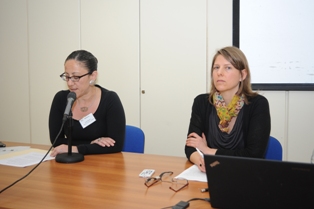Language can further social order and grant access to social and economic status, said the keynote speaker at an international three-day conference on multilingualism, held at AUB, April 7-9.
Anthropologist Katherine Hoffman from Northwestern University, USA, argued that language and the choice of official language is so important that it may hinder or help the implementation of justice. Hoffman took the example of Morocco where the official judicial language is Arabic, but where many citizens from the provinces communicate in their local language, thus compelling judges to learn the people’s language in order to achieve justice.
Hoffman was speaking on the first day of Multilingualism Across Disciplinary Borders (MAD 2014), which brought together academics and researchers from Lebanon, Europe, and the United States.
Organized by the Department of English and the Center for English Language Research and Teaching (CELRT), in collaboration with the Lebanese University Centre des Sciences du Language et de la Communication, the conference is sponsored by the AUB Office of the Provost, AUB Arts and Humanities Initiative, AUB Faculty of Arts and Sciences, Lebanese National Council for Scientific Research (CNRS), Institut de Recherche pour le Development – France, Institut National des Langues et Civilisations Orientales – France and Empirical Foundations of Linguistics – France.
“We hope that this conference and related projects will help set the stage for research on issues related to multilingualism in a region where language is at the heart of many societal and educational debates,” said Lina Choueiri, associate professor of linguistics and the current CELRT director and co-organizer of the conference.
Choueiri added that she hopes the conference would also help provide a platform linking researchers across disciplinary borders.
Several topics in linguistics are being addressed by the conference, including a paper by Isabelle Grappe and Roohi Malik of the British Council on the challenges faced by Lebanese teachers in motivating Syrian refugee students to learn a foreign language.
The researchers found that once the teachers and the kids understood that language is knowing about others and their related issues, as well as seeing situations from the others’ perspectives, their motivation increased and they participated more actively in the whole process.
In exposing “How linguistic and cultural mediation can improve the learning process of languages”, Claire Danchin Akiki of the Institut Francais du Liban and Siham Harb of the Lebanese University and Universite Saint Joseph stressed the importance of mediation in the classroom as an invaluable teaching tool.
“By transferring between languages and using the everyday slang that students are most comfortable with, one can get the message across, allowing the students to relate to the subject at hand,” explained Harb. “We want solutions that deal with the reality on the ground and avoid offering superficial solutions even if they are the official prescription.”
“Lebanon remains a multi-linguistic environment with both the challenges and opportunities of multiple languages,” said FAS Dean Patrick McGreevy. “The learning and speed of languages remains tied to their perceived social, economic and political power.”
A poster session and exhibition was organized on April 7, 2014 in West Hall Common Room, including projections and posters on themes related to multilingualism in Lebanon. Exhibits included: translation of lyrics sung by Egyptian Abdel Halim Hafez by AUB students of English 233; Arabic transliteration and Romanization in multilingual Lebanon by Tala Fleyfel (AUB English Language), a project that discussed and commented on writing English in Arabic script and the Romanization of Arabic; mapping the borders of multilingualism in select Beirut neighborhoods, by Alice Kezhaya (AUB English Literature), a project analyzing signage to discover the borders of languages in multilingual Beirut neighborhoods; and perceptions of how foreign language anxiety affects achievement in Lebanese tertiary class rooms: the case of AUB, by Arcella Reyes (AUB Linguistics graduate thesis), a scientific poster reporting on research in progress.

